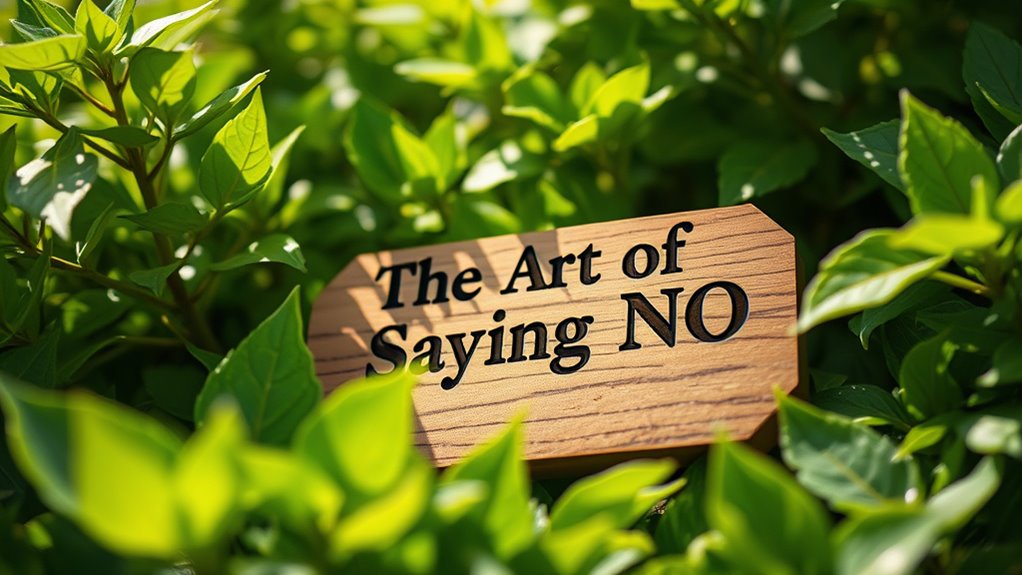“Setting boundaries is about respecting your limits and asserting your needs. Asserting yourself by saying no can protect your well-being, reduce stress, and foster healthier relationships. When you communicate clearly and confidently, you show that your needs matter, which builds mutual respect. Remember, boundaries are not barriers but bridges to understanding. If you want to discover more ways to strengthen your boundaries and improve your interactions, keep exploring these key concepts.”
Key Takeaways
- Saying no affirms your boundaries and prioritizes your well-being.
- Clear boundaries foster mutual respect and understanding in relationships.
- Assertiveness in saying no protects your energy and reduces stress.
- Boundaries are tools for honest communication and healthier interactions.
- Mastering the art of saying no empowers self-care and authentic living.

Boundaries define where your personal space begins and ends, shaping how you interact with others and protect your well-being. When you establish clear limits, you’re actively practicing self-care by safeguarding your energy and emotional health. Saying no isn’t always easy, but it’s an essential part of assertiveness, which empowers you to communicate your needs confidently. Recognizing your limits means understanding that your time, energy, and emotions are valuable. When someone asks for more than you’re willing or able to give, responding with a firm “no” isn’t selfish; it’s necessary for your mental and emotional resilience. By setting boundaries, you’re affirming that your well-being comes first, and that you deserve respect and consideration.
Learning to say no is fundamentally about assertiveness—standing up for yourself without guilt or apology. It’s about being honest and direct, while still maintaining kindness. When you practice assertiveness, you create a space where your needs are acknowledged and honored. This doesn’t mean you have to be confrontational; it simply means you communicate your limits clearly. For example, if a coworker asks for your help on a project when you’re already overwhelmed, you might say, “I’d love to help, but I’m already committed to other tasks today.” This straightforward response respects both your boundaries and the other person’s feelings. Over time, being assertive helps you establish a reputation for reliability and self-respect.
Setting boundaries also supports your mental health by reducing stress and preventing burnout. Saying no also involves understanding that your boundaries may shift depending on the situation. It’s okay to prioritize self-care and to recognize when you need to protect your energy. Setting boundaries isn’t about rejecting others; it’s about creating a healthy balance between your needs and their expectations. The more you practice, the more natural it becomes to say no without feeling guilty. Remember, boundaries are not barriers but bridges that allow you to foster healthier relationships. They help ensure that your interactions are respectful and mutually beneficial. When you’re clear about your limits, others are more likely to respect them, which leads to better communication and fewer misunderstandings.
Ultimately, mastering the art of saying no is a gift you give yourself. It’s a declaration that your well-being matters, and that you’re committed to self-care and assertiveness. When you set and uphold your boundaries, you create a life where your needs are acknowledged and protected. Your ability to say no when necessary is a sign of strength, not weakness. It’s a vital skill that fosters respect—both for yourself and from others—and helps you live authentically and intentionally.
Frequently Asked Questions
How Can I Say No Without Feeling Guilty?
You want to say no without guilt, and assertiveness training can help you develop that confidence. Focus on honest communication, expressing your boundaries clearly and kindly. Building emotional resilience enables you to handle any uncomfortable feelings that come up. Remember, saying no is a form of self-care, and practicing it regularly strengthens your boundaries. Over time, you’ll feel more comfortable and less guilty when prioritizing your needs.
What Are the Best Phrases to Decline Politely?
Imagine you’re faced with a request, and suddenly, the perfect phrase comes to mind. You can say, “I appreciate you thinking of me, but I can’t this time,” using assertive language with an empathetic tone. Or try, “Thanks for asking, but I need to prioritize other commitments.” These phrases help you decline politely, respecting both your boundaries and the other person’s feelings, making it easier to say no confidently.
How Do Boundaries Improve Personal Relationships?
Boundaries improve your personal relationships by establishing trust building and emotional safety. When you set clear limits, you communicate what’s acceptable, reducing misunderstandings. This openness invites honesty and respect, strengthening your connection. By respecting your own needs and boundaries, you encourage others to do the same, fostering mutual trust and emotional safety. Ultimately, boundaries create a healthier, more balanced relationship where everyone feels valued and secure.
When Is It Okay to Break Your Own Boundaries?
You might wonder when it’s okay to break your own boundaries, especially for self-care or emotional resilience. Sometimes, you need to prioritize your well-being, accept help, or adapt to new circumstances. In those moments, breaking your boundaries isn’t a failure but a necessity for growth. Recognize when your limits hinder your health, and remember, flexibility can strengthen your resilience and support your ongoing self-care journey.
How Can I Respect Others’ Boundaries Effectively?
To respect others’ boundaries effectively, you need emotional intelligence to recognize their signals and feelings. Practice active listening and observe their non-verbal cues. Use assertiveness training to communicate openly and respectfully, showing you value their limits. Remember, respecting boundaries isn’t just about avoiding overstepping; it’s about building trust and understanding. Stay attentive, empathetic, and clear in your interactions to foster healthy, respectful relationships.
Conclusion
Remember, setting boundaries isn’t about shutting others out; it’s about protecting your peace. When you say no, you’re not burning bridges—you’re building respect and understanding. Keep in mind, you can’t pour from an empty cup, so prioritize yourself. It’s often said that you can’t please everyone, but you can stay true to yourself. Trust that when you honor your limits, everything else falls into place more naturally.









